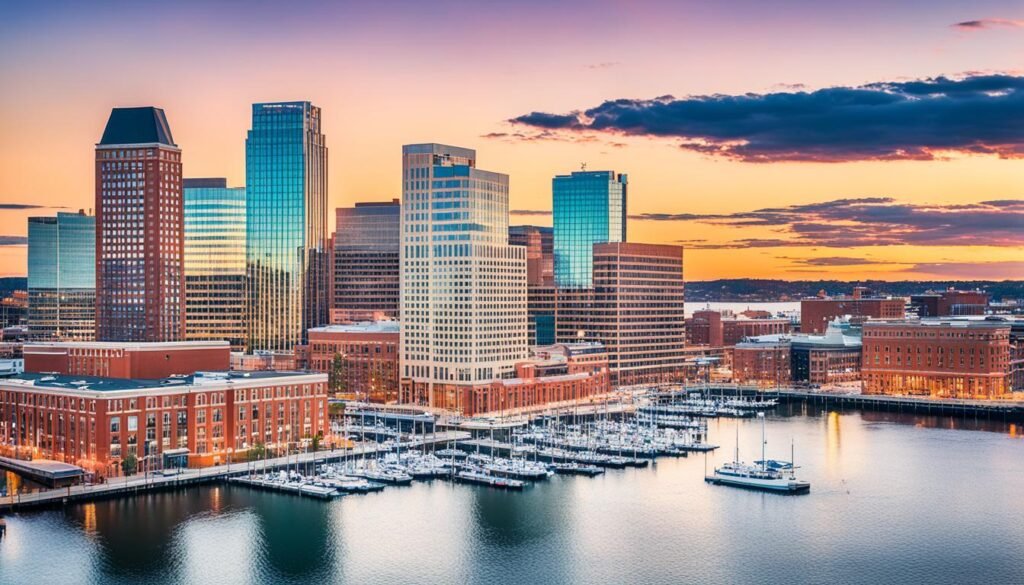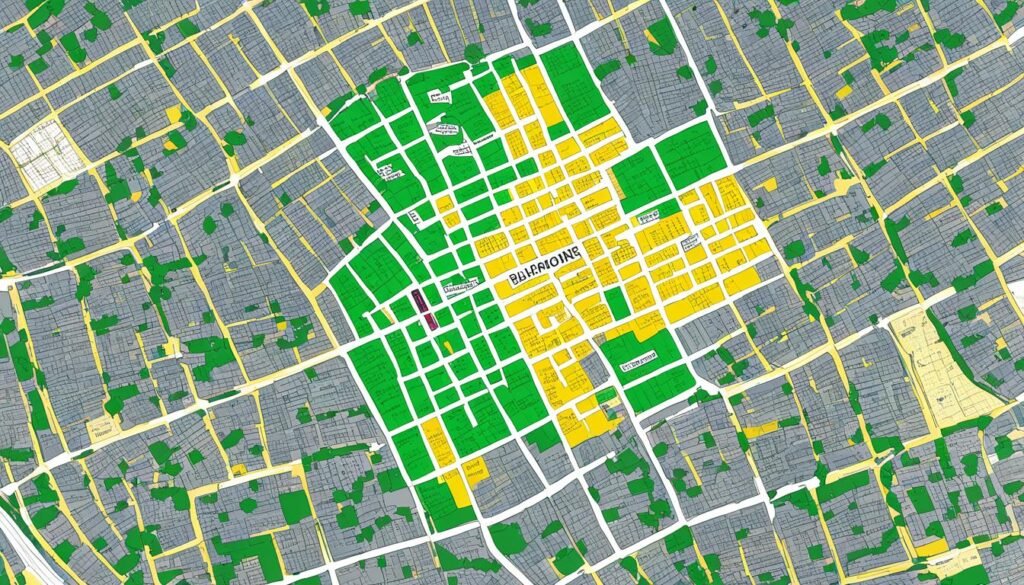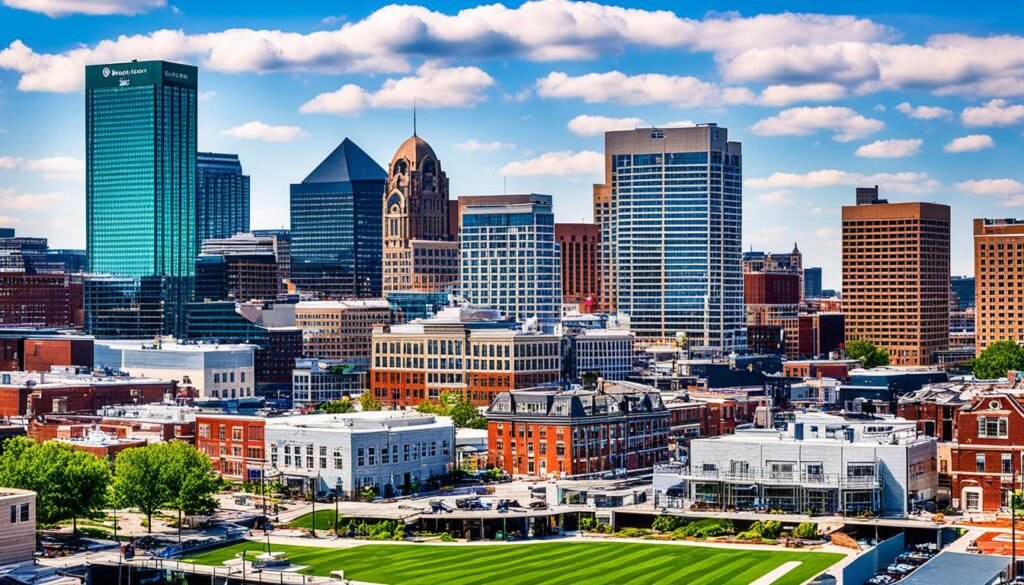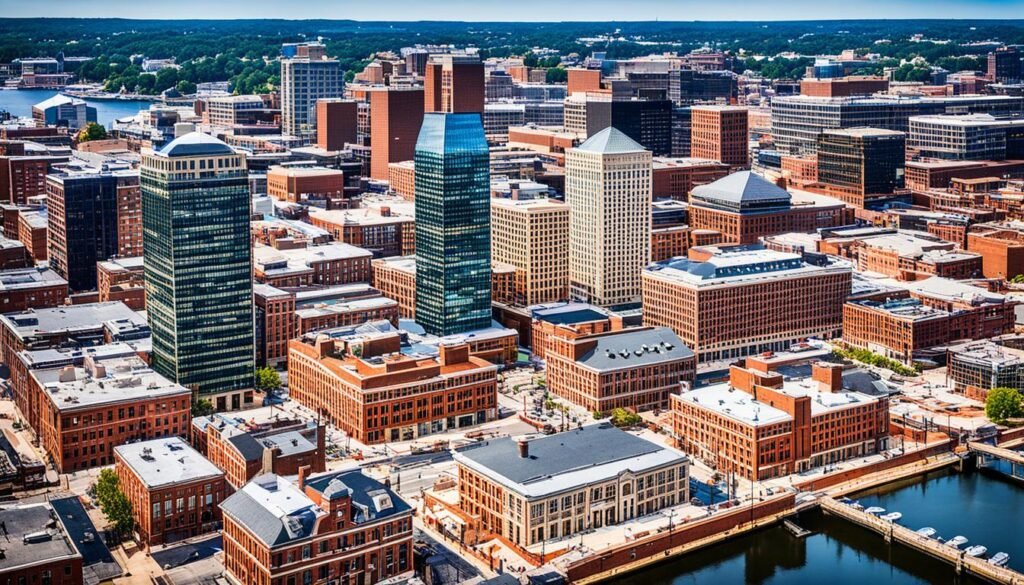Last Updated on: 4th May 2024, 01:33 pm
With a rich tapestry of history and culture and an economy that boasts sectors ranging from healthcare to technology, Baltimore is rising as a noteworthy contender for real estate investors pondering the question: is Baltimore a good place to invest in real estate? The city’s recent housing market data tells a tale of potential and dynamism, as home prices in Baltimore experienced an impressive 9.4% surge, outpacing the national average and marking the largest yearly increase since May 20221. This, combined with the stability in pricing – reflected by a median sale price of $326,000 – positions Baltimore real estate investment opportunities in a compelling light for the discerning investor.
Key Takeaways
- Baltimore’s housing market is showing signs of growth with substantial home price increases1.
- Steady population growth contributes to the high demand for housing in Baltimore.
- Diverse economy supports potential real estate investment returns.
- New listing surge indicates a vibrant market with upcoming opportunities1.
- Homes are selling at listed prices, demonstrating market stability1.
- Baltimore’s real estate offers investment opportunities given a balanced mix of price hikes and listing availability1.
Assessing the Current State of Baltimore’s Housing Market
Understanding the complexities of the Baltimore housing market requires a multifaceted approach that encompasses historical insight, current trends, and predictive analytics. For investors seeking opportunities within this market, it’s essential to examine the statistical data presented by various economic indicators and initiatives such as Vacants to Value (V2V) aimed at urban revival. The trajectory of the baltimore real estate market analysis can determine the potent viability of investment endeavors.
Overview of Baltimore Real Estate Market Analysis
The scope of Baltimore’s real estate trends in baltimore is best understood through the lens of its history and current initiatives. Presently, Baltimore City is grappling with 16,000 vacant and abandoned buildings, a sizable portion of which—about 25%—are owned by the city itself2. This reality is juxtaposed with the fact that Baltimore has witnessed a significant demographic shift, losing nearly one-third of its population in the last half-century2. Yet, the introduction of early data tools such as Vacant House File and CityStat has represented a dedicated effort to address these vacant properties2.
Baltimore Housing Market Forecast for 2024-2025
Looking forward, the baltimore housing market forecast anticipates a nuanced blend of challenges and opportunities. The V2V initiative, in its strategy to target about 700 vacant properties in weaker market areas, hinges on the engagement of private market forces for redevelopment2. This approach is coupled with efforts to drive additional private investment by fostering mixed-income housing development in designated areas, thereby enhancing the surrounding fabric2. An informed forecast must also acknowledge the V2V’s realistic outlook towards the city’s long-term evolution, understanding that not all vacant houses can be eliminated and, thus, focusing on sustainable improvements in clusters adjacent to functioning markets2.
Impact of Economic Indicators on Baltimore Real Estate
As part of the broader baltimore real estate market analysis, economic indicators play a pivotal role. Baltimore’s Neighborhood Typology, which categorizes residential markets into competitive, emerging, stable, transitional, and distressed types, enhances our understanding of the market’s various segments2. This classification not only informs investment strategies but also underscores the differential impacts of economic policies and private sector initiatives on designated neighborhoods.
In analyzing real estate trends in baltimore, the nuanced perspectives on vacancies, demographic shifts, and strategic initiatives offer investors a comprehensive view of the market’s potential. It is through these lenses that one can anticipate the trajectory of Baltimore’s housing market and position for potentially fruitful investments.
<!– Ensuring the
| Category | Description | Initiative |
|---|---|---|
| Vacant Properties | 16,000 vacant and abandoned buildings, with 25% city-owned2 | CityStat, Vacant House File |
| Population Change | Baltimore lost nearly one-third of its population over 50 years2 | Long-term urban strategy |
| Market Typology | Competitive, emerging, stable, transitional, and distressed | Neighborhood analysis |
| V2V Initiative | 700 targeted properties for redevelopment in weak markets2 | Engagement of private market forces |
Is Baltimore a Good Place to Invest in Real Estate
Exploring the landscape of investment opportunities, one may find that reasons to invest in Baltimore real estate are multifaceted and compelling. A key factor influencing this scenario is the significant trend of investor purchases, with more than a third of all city home sales in the first half of 2022 being snapped up by investors, a figure that has doubled since just three years prior3. This surge signifies a growing confidence in Baltimore’s market and indicates a robust demand for its properties.
A deeper dive into the demographics reveals a startling but opportunistic trend within predominantly Black neighborhoods such as Broadway East, Carrollton Ridge, and Harlem Park, where investors acquired three out of every five homes sold since 20193. The investment is not merely about acquisition but also renovation and improvement, with firms like the Philadelphia-based GNR Group not only obtaining 350 vacant homes since 2019 but also renovating approximately 140 of them, thereby revitalizing communities and enhancing the landscape3.
The upward trajectory in value is notable as well, with the median home sales price to an investor climbing from $42,000 in 2019 to $72,000 earlier this year3, underscoring the considerable appreciation and the potential for solid returns. Investment firms are keenly aware of Baltimore’s promise, as exemplified by ABC Capital Investments purchasing around 1,200 homes since 2015 and Property Invest USA vouching for 10% returns on investments starting at just $85,0003. Local company CR of Maryland, targeting vacant homes for renovation, has also recognized the potential for profitability by offering turnkey rentals to investors3.

Moreover, the research undertaken by Johns Hopkins University has shed light on the fact that investors now own over a quarter of city homes with vacant building notices3. This data not only suggests a high level of engagement by investors willing to tackle some of the challenges the city faces but also presents a picture of a market ripe with opportunities for those willing to invest in a city’s revival.
For those seeking reasons to invest in Baltimore real estate, the ecosystem of Baltimore’s property market is buoyant with potential. Investors are not just buying properties; they’re investing in the fabric and future of Baltimore, contributing to a narrative of renewal and resilience.
Identifying the Best Neighborhoods to Invest in Baltimore
Finding the most promising locations within the Charm City is key to unlocking the full potential of your investment. The best neighborhoods to invest in Baltimore are those that combine cultural allure with economic vitality. The Department of Housing and Community Development (DHCD)’s array of programs, like the Fixed Pricing and Open Bid Programs, enables smart investments in these burgeoning areas4.

Canton Square and Fells Point: A Tale of Charm and Investment Potential
Both Canton Square and Fells Point offer an irresistible blend of historic ambience and modern amenities that make them standout picks for investors. With transformation initiatives being a staple in these communities, the development opportunities are ripe4.
The Allure of Mount Vernon and Roland Park
Mount Vernon and Roland Park present a unique mix of architectural beauty and community cohesiveness. With plans to revitalize city-owned properties through the upcoming Bundle Program, the growth in these neighborhoods is poised to flourish4.
Exploring the Untapped Potential in Halethorpe and Nearby Ellicott City
The robust interest in the EOI Program reflects the untapped potential that neighborhoods like Halethorpe and Ellicott City represent. These areas are less known but hold immense possibilities for investments that tap into Baltimore’s ongoing transformations4.
DHCD’s use of RFP and RFQ Programs underscores the need for experienced developers in Baltimore’s revitalization, with these identified neighborhoods standing out as the best neighborhoods to invest in Baltimore. Their transformative journeys, with visible before and after examples, depict the value embedded within their confines4.
Understanding the Investment Climate in Baltimore
The investment landscape in Baltimore is shaping up to be a significant arena for both local and national investors, with recent statistics indicating a robust uptick in investor involvement. More than a third of all city home sales recorded in the first half of 2022 were investor purchases, marking a substantial increase from three years prior3. This surge in investment activity suggests that Baltimore real estate investment opportunities may be particularly ripe.
Focused investment in predominantly Black neighborhoods has increased, which can be evidenced by the acquisition habits in areas such as Broadway East in East Baltimore, Carrollton Ridge in the Southwest, and Harlem Park in West Baltimore, where investors have bought three out of every five homes sold since 20193. This concentrated buying pattern indicates underlying real estate trends in Baltimore that investors are keen to capitalize on.
To further understand the growth perspective, consider this: the median home sales price to an investor in Baltimore soared from $42,000 in 2019 to $72,000 in early 20223. This significant rise in property values is reflective of the heightened demand and suggests a narrowing window for securing optimal Baltimore real estate investment opportunities.
Investors are taking notice of the city’s stock of properties, especially those flagged with vacant building notices, which are now owned by investors in more than a quarter of cases3. This ownership trend showcases a proactive approach towards revitalizing and capitalizing on Baltimore’s housing market.

Corporations like Philadelphia-based GNR Group and Miami’s Property Invest USA have entrenched themselves in the Baltimore market. GNR Group has acquired and started renovating its goal of 1,000 rental homes, while Property Invest USA offers a 10% return on investments with minimums as accessible as $85,0003. These strategic moves highlight the growing acknowledgment of Baltimore’s potential as a key investment hub.
The local firm CR of Maryland represents another active entity on this playing field, having purchased hundreds of homes in recent years, focusing on upgrading them to then offer as turnkey rentals to investors3. These concerted efforts across varying investor profiles illuminate a vibrant and diverse investment atmosphere.
| Investor | Homes Acquired | Strategy |
|---|---|---|
| GNR Group | 350 | Renovate and manage Section 8 rentals |
| Property Invest USA | 123+ | Guarantee 10% ROI with low-entry investments |
| CR of Maryland | Hundreds | Sell renovated vacants as turnkey rentals |
Those seeking to delve into real estate trends in Baltimore should consider these data points as part of a broader narrative that indicates robust investment potential within the city. As investors continue to demonstrate confidence in Baltimore’s housing market, the landscape seems to be inviting for both new entrants and seasoned investors alike.
Conclusion
The ongoing discourse about whether is Baltimore a good place to invest in real estate leads us to a multifaceted conclusion. The city’s administration, fully aware of the challenges at hand, has pledged a substantial investment in urban redevelopment, committing $300 million over 15 years. Intended to stimulate economic vigor, this funding, alongside support from the state of Maryland and private investments, aims to potentially generate a remarkable $3 billion5 for redevelopment projects. These endeavors indicate an energized marketplace ripe for Baltimore real estate investment opportunities.
Statistical analysis reveals that this investment is coupled with a significant strategic shift towards revitalization, with nearly a 20% reduction in vacant buildings over the past five years5, this indicates a promising trend for the local property market. Shedding light on the city’s commitment to safety and progress, an initiative to mark unsafe buildings with reflective red squares highlights proactive measures to address urban decay5. This, coupled with the strategic focus on renovating entire blocks, reflects a holistic approach to tackling blight in Baltimore’s urban landscape5.
Recognizing the abundance of abandoned homes—over 13,000—Baltimore’s officials have creatively introduced a program allowing properties to be purchased for as little as $1, earmarking them for community-good and preventing exploitative real estate practices6. This suggests a unique opportunity for potential investors and underscores the administration’s confidence in the city as a fertile ground for real estate growth.

The Buy Into Bmore program and similar initiatives reflect a dynamic approach to ownership and development, and the Scott administration’s plan to address 35,000 homes gives a substantial boost to Baltimore real estate investment opportunities6. Coupled with these efforts, a tracking tool for “whole block” development greatly enhances transparency, fostering an environment brimming with possibility for both novice and experienced investors6.
Investing in Baltimore real estate is not merely about seizing opportunities in the city’s core; one must consider the broader landscape, where over 300,000 tenants populate the surrounding suburbs7. Regions like District Heights, with rental properties commanding robust leads and averaging less than 30 days on the market, denote a heated demand7. Not all areas, however, offer the same profitability, and as taxes vary, so does the potential for returns7. Hence, investors are encouraged to diligently assess the localized markets for balanced investment strategies that satisfy the expectations of the growing tenant population.
Ultimately, the burgeoning landscape of the city’s real estate market juxtaposed with strategic government initiatives and vigilant adaptability to economic trends, prompts a favorable outlook that amplifies Baltimore’s allure as an investment hub. Whether exploring rental markets in the suburbs or leveraging city-led redevelopment projects, those pondering over is Baltimore a good place to invest in real estate may find the city’s terrain fertile for planting the seeds of their investment endeavors. Careful analysis, informed decisions, and proactive measures will remain pivotal in navigating the promising terrain of Baltimore’s real estate investment possibilities.
Frequently Asked Questions (FAQs)
For those considering baltimore real estate investment, understanding the regulations that govern affordability and eligibility is critical. In particular, the Moderately Priced Dwelling Unit Law mandates that 15% of housing in new subdivisions with 10 or more units must be designated as MPDUs8. This initiative provides a unique opportunity for investors eyeing the Baltimore housing market forecast and considering investing in properties that include affordable housing options.
With eligibility for the MPDU program extending to a broad range of individuals, including Annapolis employees and Naval Academy staff, the pool of potential renters or buyers is considerable8. For single investors or households, the maximum income levels to qualify for the MPDU program differ based on size, ranging from $82,875 for an individual to $156,188 for a household of eight8. It’s vital for those investing in baltimore properties to take note of these specifics to identify the appropriate target audience for their investment properties.
Furthermore, the application process for a Certificate of Eligibility, which can be done in person, by mail, or electronically, allows for a continuous influx of qualified applicants, ensuring a steady demand for MPDU rentals8. The current availability of MPDU rental units, like those at Bell Annapolis on West Street, on a first-come, first-served basis, highlights the practical aspects of the forecast growth within this sector of the Baltimore housing market8.
FAQ
Is Baltimore a good place to invest in real estate?
What is the current state of the Baltimore real estate market?
What is the housing market forecast for Baltimore?
What impact do economic indicators have on the Baltimore real estate market?
Why should I consider investing in Baltimore real estate?
Which neighborhoods in Baltimore are the best for investment?
What is the investment climate like in Baltimore?
What are some common questions investors have about investing in Baltimore real estate?
Source Links
- https://www.noradarealestate.com/blog/baltimore-real-estate/
- https://www.federalreserve.gov/publications/putting-data-to-work-vacants-to-value.htm
- https://www.baltimoresun.com/2022/10/28/outside-investors-are-buying-up-homes-in-baltimores-low-income-and-black-neighborhoods/
- https://dhcd.baltimorecity.gov/nd/development-opportunities
- https://www.cbsnews.com/baltimore/news/baltimore-mayor-to-announcement-partnership-to-combat-vacant-homes-crisis/
- https://www.baltimoresun.com/2024/03/20/baltimore-spending-board-1-sales-vacant-homes-council/
- https://www.baymgmtgroup.com/blog/best-places-to-invest-rental-property/
- https://www.annapolis.gov/610/Moderately-Priced-Dwelling-Units-MPDU
As a passionate, global-thinking Real Estate Investor I am constantly looking for the best opportunities to invest in Properties. With Aparthotel.io I am building an All-In-One Global Real Estate Platform, where people can analyse, rent or invest in properties. Additionally I help Investors with comparing the best financing options as well as give detailed Consultation on the buying process for Real Estate Investments around the world. I am looking forward to sharing my knowledge on this Website and feel free to reach out to me if you have any questions.
Comments